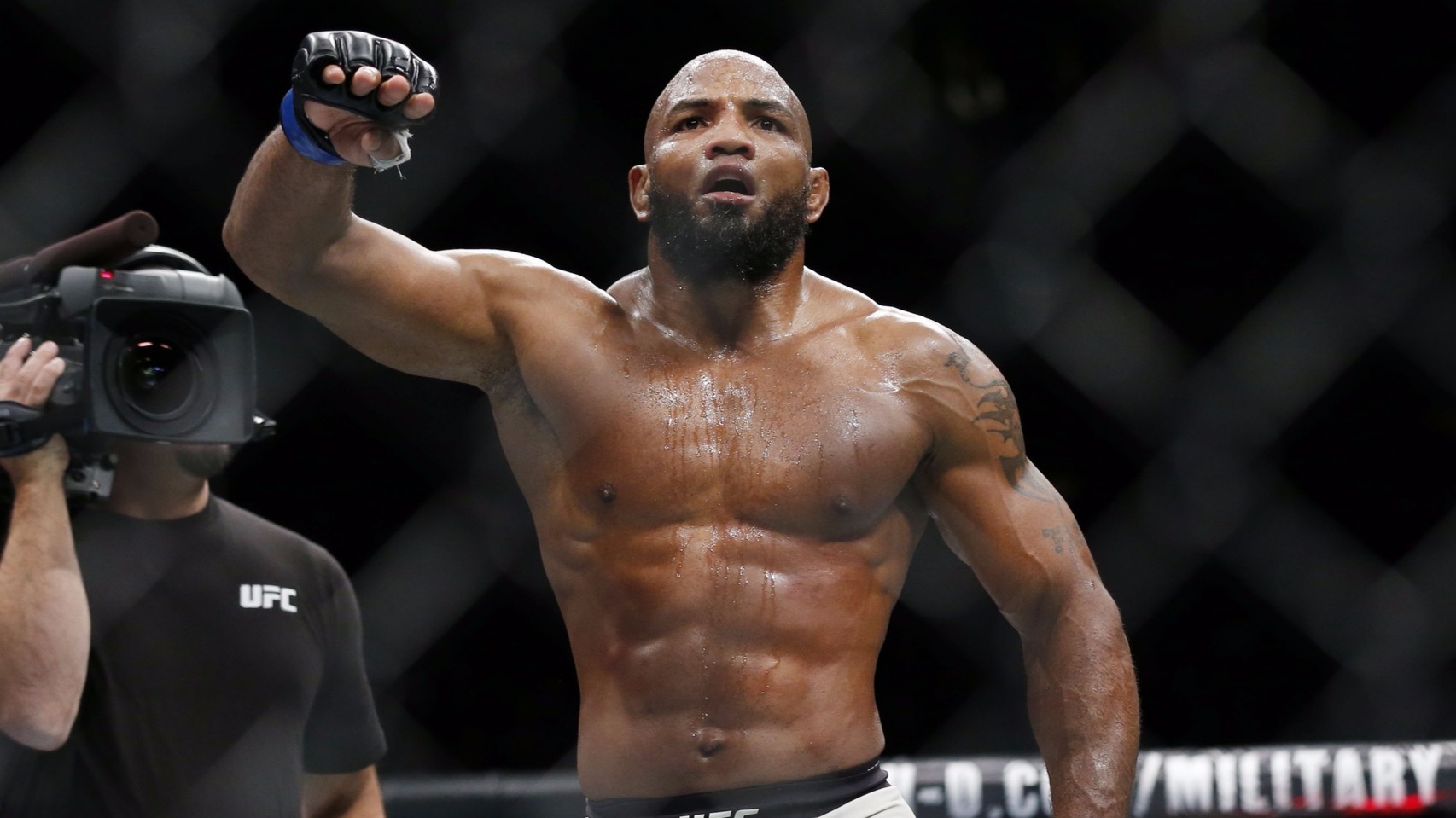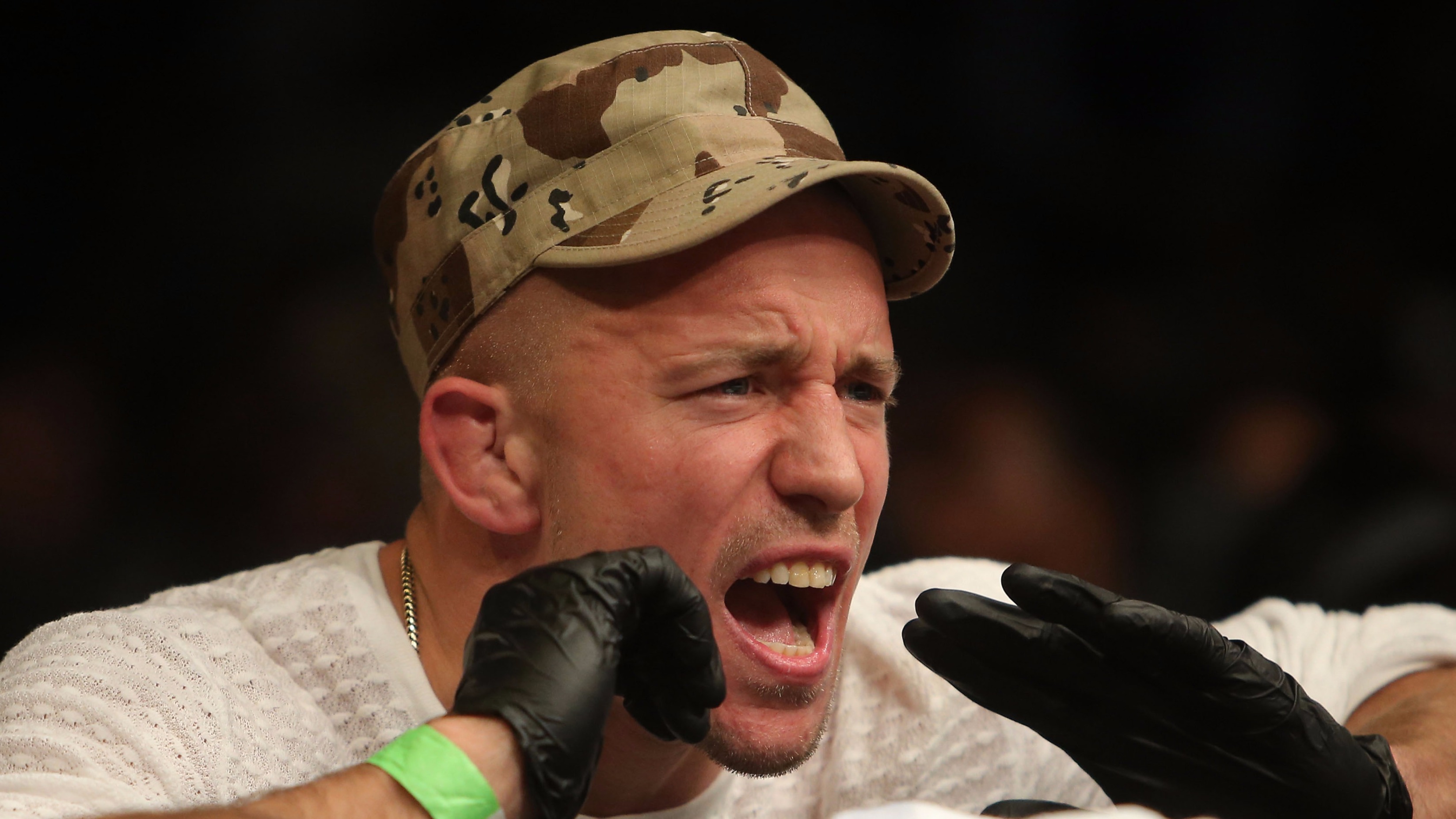UFC, Not Athletes, To Blame For Middleweight Misfortune
UFC, Not Athletes, To Blame For Middleweight Misfortune
The UFC's middleweight division is in shambles thanks to wacky decision making from the promotion.

By Elias Cepeda*
*All views expressed are of the writer's and do not necessarily reflect the views of FloCombat as a whole
The UFC recently made a mess of its once proud championship title picture. UFC titles have been unilaterally stripped or otherwise replaced at unprecedented rates across multiple weight classes.
Hell, replacement interim titles have even been replaced by second interim titles crowning new, new champs before any of us could even keep up with the initial strange changes. For well over a year, the UFC's middleweight division has been one of the more frustrating situations for purist fans of fairness in rankings, title shots, and championship titles themselves.
A melange of dubious matchups, injuries, and returning legends has frustrated any possibility for clarity and consistency at the top of the 185-pound division. After filling in on short notice for former champion Chris Weidman in June 2016 and upsetting Luke Rockhold at UFC 199 to become the new middleweight king, Michael Bisping sidestepped the division's top contenders to instead fight Dan Henderson in the legend's final career bout at UFC 204 last October.
Leaving deserving contenders such as Yoel Romero and Ronaldo "Jacare" Souza in the cold was bad enough. But when the 45-year-old Henderson still managed to soundly beat Bisping in their contest only to be railroaded by a horrid judges' decision, the division's title was further tarnished.
Since that fight in October 2016, Bisping has battled injuries, preventing him from competing. That's when the UFC stepped in and further muddied the middleweight waters by introducing an interim title that was up for grabs in July.

Photo Credit: © Adam Hunger-USA TODAY Sports
The contenders in that fight, Robert Whittaker and Romero, both certainly had already laid legitimate claims to deserving a title shot. The problem was that the golden belt they fought for meant even less than the one Bisping possessed after his gift decision over Henderson.
Say what you will about Bisping, but creating a new belt in his division after he last defended the real title only nine months before was wrong. Now Whittaker and Bisping both have belts, but Whittaker is injured and unable to fight the Brit. So the confusion and mess continues in the once wholesome fold.
If Georges St-Pierre is to be believed, the UFC's plan to bring back stability and legitimacy to the middleweight championship title is big on heavy-handed fighter control and low on correcting its own strange types of decisions that helped contribute to the division's downfall.
In short, the returning former welterweight kingpin who will face Bisping at UFC 217 in November says he's now somehow contractually obligated to fight Whittaker immediately should he beat Bisping.
"I have to defend my title. It's written in my contract. I have to defend my title if I win," St-Pierre recently told The MMA Hour on MMAFighting.com.
"You never know in advance... But if we follow the logic [I'll fight Whittaker after beating Bisping] that's what the UFC told me. That's what they signed me for."
In response to that revelation, Bisping cooly and correctly explained that in reality St-Pierre is in the driver's seat.
"Georges is still in the position of power, much as I don't like to admit that," the champ said on his "Believe You Me" podcast.
"So really... one would assume that he can really do what he wants. They can't force him to fight."
Bisping, of course, is right.
The idea that St-Pierre could be legally tied to a supposed title defense clause should he beat Bisping to become middleweight champion is absurd on its face.
Let's leave aside for a moment the whole problematic notion of UFC fighters being tied so exclusively to the promotion while also being labeled by the company as "independent contractors."
The assurance the UFC is trying to give fans that GSP will stick around the middleweight division after his next fight is not something the promotion could actually deliver on unless A) He decides that's what he wants to do if and when the situation arises, or B) The UFC resorts to outright slavery or indentured servitude.
St-Pierre could fight Bisping and then, of course, stop fighting once again just as he did in 2013. St-Pierre could also fight Bisping, retire again, then come back and decide he wants to fight at another weight class.
There are plenty of other possibilities I'm probably not thinking of, either. The UFC says he is contracted to only fight for it, but there's no reason to believe that the UFC can actually dictate what division he must compete in if he's willing and offering to give it fights at other classes.

Photo Credit: Tom Szczerbowski-USA TODAY Sports
The Canadian legend could say a different division suits his health, general preferences, or goals better. And he'd have every right to do so.
In his response, Bisping pointed to GSP's soft power given his ability to sell pay-per-views, especially in his native Canada, as the driving reason that St-Pierre will do whatever St-Pierre wants.
Beyond that, there is no real precedent for the promotion to be able to legally force a fighter -- a supposed independent contractor, no less -- to compete at a particular weight for an extended period into the future. The UFC couldn't force Kelvin Gastelum or Johny Hendricks to stay at middleweight, and it couldn't legally compel St-Pierre to do so, either.
In fact, if a healthy, exclusively contracted St-Pierre is ready and willing to fight any number of fighters at other divisions than middleweight, the UFC could conceivably find itself losing promotional rights to him if it refuses to offer him a fight over a set period of time. After all, it is common for promotional fight contracts to include not just requirements of exclusivity from an athlete but also that the promotion offers acceptable fights to the athlete and his or her management with a certain frequency.
The UFC is already stretching if not violating the limits of independent contractor designations. Its contracts don't usually provide any job security for athletes and include no year-round health insurance, no pension, and no collective bargaining rights but are exclusive. They also mandate certain uniforms be worn during fight weeks and effectively require unpaid appearances and PR work.
The idea being put forth now that the UFC can also control the weight of a fighter, or decide his or her opponent months or even years in advance, with all flexibility available to the promotion alone and all responsibility on the athlete alone, is dubious and without any real basis. Furthermore, that type of archaic control over labor is not something that should be rooted for by any real fight fan.
We all want to see legitimacy return to the middleweight division, but the UFC laying claim to even more control over the livelihoods of your favorite fighters isn't the way to make it happen.
Don't miss breaking news, feature stories, event updates, and more. Sign up for the FloCombat mailing list today.
*All views expressed are of the writer's and do not necessarily reflect the views of FloCombat as a whole
The UFC recently made a mess of its once proud championship title picture. UFC titles have been unilaterally stripped or otherwise replaced at unprecedented rates across multiple weight classes.
Hell, replacement interim titles have even been replaced by second interim titles crowning new, new champs before any of us could even keep up with the initial strange changes. For well over a year, the UFC's middleweight division has been one of the more frustrating situations for purist fans of fairness in rankings, title shots, and championship titles themselves.
A melange of dubious matchups, injuries, and returning legends has frustrated any possibility for clarity and consistency at the top of the 185-pound division. After filling in on short notice for former champion Chris Weidman in June 2016 and upsetting Luke Rockhold at UFC 199 to become the new middleweight king, Michael Bisping sidestepped the division's top contenders to instead fight Dan Henderson in the legend's final career bout at UFC 204 last October.
Leaving deserving contenders such as Yoel Romero and Ronaldo "Jacare" Souza in the cold was bad enough. But when the 45-year-old Henderson still managed to soundly beat Bisping in their contest only to be railroaded by a horrid judges' decision, the division's title was further tarnished.
Since that fight in October 2016, Bisping has battled injuries, preventing him from competing. That's when the UFC stepped in and further muddied the middleweight waters by introducing an interim title that was up for grabs in July.

Photo Credit: © Adam Hunger-USA TODAY Sports
The contenders in that fight, Robert Whittaker and Romero, both certainly had already laid legitimate claims to deserving a title shot. The problem was that the golden belt they fought for meant even less than the one Bisping possessed after his gift decision over Henderson.
Say what you will about Bisping, but creating a new belt in his division after he last defended the real title only nine months before was wrong. Now Whittaker and Bisping both have belts, but Whittaker is injured and unable to fight the Brit. So the confusion and mess continues in the once wholesome fold.
If Georges St-Pierre is to be believed, the UFC's plan to bring back stability and legitimacy to the middleweight championship title is big on heavy-handed fighter control and low on correcting its own strange types of decisions that helped contribute to the division's downfall.
In short, the returning former welterweight kingpin who will face Bisping at UFC 217 in November says he's now somehow contractually obligated to fight Whittaker immediately should he beat Bisping.
"I have to defend my title. It's written in my contract. I have to defend my title if I win," St-Pierre recently told The MMA Hour on MMAFighting.com.
"You never know in advance... But if we follow the logic [I'll fight Whittaker after beating Bisping] that's what the UFC told me. That's what they signed me for."
In response to that revelation, Bisping cooly and correctly explained that in reality St-Pierre is in the driver's seat.
"Georges is still in the position of power, much as I don't like to admit that," the champ said on his "Believe You Me" podcast.
"So really... one would assume that he can really do what he wants. They can't force him to fight."
Bisping, of course, is right.
The idea that St-Pierre could be legally tied to a supposed title defense clause should he beat Bisping to become middleweight champion is absurd on its face.
Let's leave aside for a moment the whole problematic notion of UFC fighters being tied so exclusively to the promotion while also being labeled by the company as "independent contractors."
The assurance the UFC is trying to give fans that GSP will stick around the middleweight division after his next fight is not something the promotion could actually deliver on unless A) He decides that's what he wants to do if and when the situation arises, or B) The UFC resorts to outright slavery or indentured servitude.
St-Pierre could fight Bisping and then, of course, stop fighting once again just as he did in 2013. St-Pierre could also fight Bisping, retire again, then come back and decide he wants to fight at another weight class.
There are plenty of other possibilities I'm probably not thinking of, either. The UFC says he is contracted to only fight for it, but there's no reason to believe that the UFC can actually dictate what division he must compete in if he's willing and offering to give it fights at other classes.

Photo Credit: Tom Szczerbowski-USA TODAY Sports
The Canadian legend could say a different division suits his health, general preferences, or goals better. And he'd have every right to do so.
In his response, Bisping pointed to GSP's soft power given his ability to sell pay-per-views, especially in his native Canada, as the driving reason that St-Pierre will do whatever St-Pierre wants.
Beyond that, there is no real precedent for the promotion to be able to legally force a fighter -- a supposed independent contractor, no less -- to compete at a particular weight for an extended period into the future. The UFC couldn't force Kelvin Gastelum or Johny Hendricks to stay at middleweight, and it couldn't legally compel St-Pierre to do so, either.
In fact, if a healthy, exclusively contracted St-Pierre is ready and willing to fight any number of fighters at other divisions than middleweight, the UFC could conceivably find itself losing promotional rights to him if it refuses to offer him a fight over a set period of time. After all, it is common for promotional fight contracts to include not just requirements of exclusivity from an athlete but also that the promotion offers acceptable fights to the athlete and his or her management with a certain frequency.
The UFC is already stretching if not violating the limits of independent contractor designations. Its contracts don't usually provide any job security for athletes and include no year-round health insurance, no pension, and no collective bargaining rights but are exclusive. They also mandate certain uniforms be worn during fight weeks and effectively require unpaid appearances and PR work.
The idea being put forth now that the UFC can also control the weight of a fighter, or decide his or her opponent months or even years in advance, with all flexibility available to the promotion alone and all responsibility on the athlete alone, is dubious and without any real basis. Furthermore, that type of archaic control over labor is not something that should be rooted for by any real fight fan.
We all want to see legitimacy return to the middleweight division, but the UFC laying claim to even more control over the livelihoods of your favorite fighters isn't the way to make it happen.
Sign Up For The FloCombat Newsletter
Don't miss breaking news, feature stories, event updates, and more. Sign up for the FloCombat mailing list today.